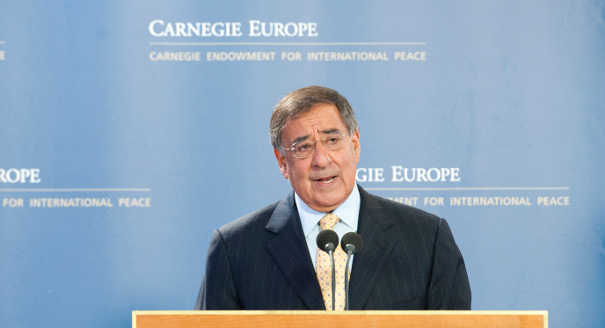Registration
Thank you!
You will receive an email confirming your registration.
U.S. Secretary of Defense Leon E. Panetta delivered his first public speech to a European audience at an event hosted by Carnegie Europe. Following Secretary Panetta’s remarks, a panel of expert commentators, including Steven Erlanger, Paris bureau chief for the New York Times, Stefan Lehne, visiting scholar at Carnegie Europe, and Carnegie Europe’s Jan Techau discussed the major issues covered in this landmark speech. Jessica Mathews, President of the Carnegie Endowment, moderated.
State of the Alliance
- Fiscal and Security Challenges: Panetta recognized that NATO is facing a number of serious challenges from the current fiscal and security environment. The struggling global economy is putting pressure on already diminishing European defense budgets, even as the alliance is confronted with a complex and volatile security environment.
- Addressing the Challenges: The successful realization of the alliance’s national security responsibility requires dependable partners that more equitably share the ensuing burden, the Secretary asserted.
- Capability Gaps and Fiscal Pressure: The operations in Libya and Afghanistan revealed some of the gaps that exist in the alliance, Panetta added. Addressing these existing gaps in military capabilities are essential to keeping NATO effective and relevant, the Secretary said:
- Libya: The lack of targeting specialists, supplies and munitions, and, most importantly, enabling capabilities seriously hindered the NATO operation, forcing the United States to compensate for larger alliance shortages, Panetta said.
- Afghanistan: A lack of experienced trainers, underfinanced trust funds for Afghan security forces, and a shortage of enablers create significant challenges for General Allen in Afghanistan, Panetta added.
- Libya: The lack of targeting specialists, supplies and munitions, and, most importantly, enabling capabilities seriously hindered the NATO operation, forcing the United States to compensate for larger alliance shortages, Panetta said.
- Defense Spending: Panetta expressed concern that fiscal pressures in the countries of the alliance could erode the political will necessary to create and maintain an equitable share of burdens. He pointed out that European defense spending is estimated to have dropped almost 2 percent annually over the past decade, and U.S. defense spending is expected to be reduced by over $450 billion in the coming decade. These reductions must be performed carefully in order to prevent the erosion of NATO’s ability to maintain its security operations.
Libya
Panetta described the campaign in Libya as marking a new chapter for NATO.
- European Leadership and a Shared Burden: NATO’s response to the situation in Libya was characterized by swift and decisive decision-making, an effective campaign and, most notably, greater European leadership. Panetta said that the Libya campaign has proven that the alliance is capable of acting collectively and sharing the ensuing burdens.
- Praising Certain Partners: Panetta commended the active contribution of NATO allies and non-NATO partners like Qatar and the United Arab Emirates in the operations in Libya, from the air strikes performed by France, the United Kingdom, Denmark, Norway, and Belgium, to the arms embargo efforts of Romania and Bulgaria.
U.S. Defense Budget
- Misplaced Assumptions: Panetta stressed that it is a mistake to assume that U.S. defense spending can continue to compensate for the shrinking defense budgets of other NATO partners.
- Future Capabilities: U.S. budget-tightening has potentially significant implications for NATO’s capabilities, Panetta added.
The Road to the NATO Summit Meeting in Chicago
- Spending Cuts and Force Structure: In order to address the challenges facing NATO, further cuts in defense spending have to be prevented or, at least, transparently and effectively coordinated among the alliance members, Panetta said.
- Essential Capabilities: Panetta also emphasized the need to review NATO operational arrangements as well as to collectively identify and protect NATO’s core military capabilities.
- Partnerships: Cooperation with capable non-NATO partners will be increasingly central to NATO’s future activities, the Secretary asserted.
- U.S. Commitment: The U.S. Secretary of Defense reasserted the U.S. commitment to NATO and called for all NATO members to invest, literally and figuratively, in the alliance in order to ensure its continuing relevance.
Panel discussion
In the ensuing panel debate, the commentators each reviewed Secretary Panetta’s speech, highlighting different aspects:
- Ambivalence and Anxiety: Erlanger described the speech as marked by ambivalence and anxiety, in essence a more political version of former Secretary Gates’ critical address to European partners at the end of his term. He added that Panetta appeared particularly worried over the fiscal threats to allied defense budgets.
- Personal Commitment: Techau expressed surprise at Panetta’s strong concern that the alliance might become hollowed out. He interpreted the speech as Panetta offering a deal to the NATO members, which now has to be answered by a reciprocal European undertaking.
- Continuity and Change: Panetta’s approach is in line with those of previous U.S. Secretaries of States, asserted Lehne. The emphasis on shared fiscal constraints–previously seen as a primarily European problem–altered the tone of the speech and presented a possibility of forming a closer alliance, he added.
- U.S. Security: The Secretary’s address was a clear message that NATO remains essential for U.S. security, Mathews stated. Panetta depicted NATO as an alliance of committed nations cooperating with capable partners, leading Mathews to add that the Secretary might see a weak or incapable alliance as having little value for the United States.
